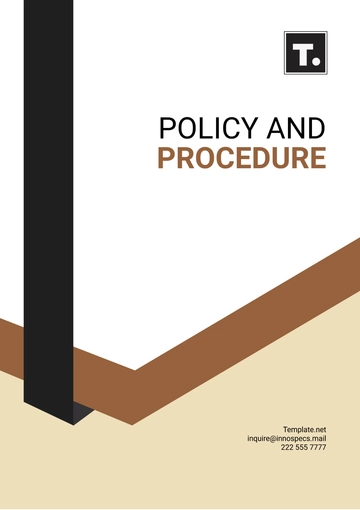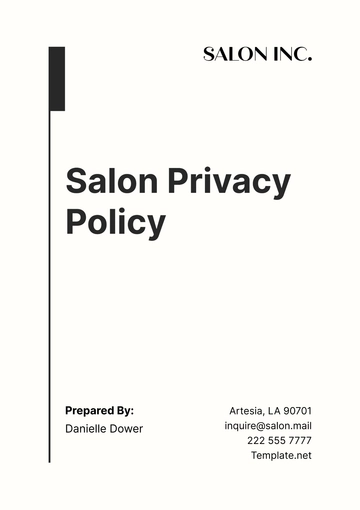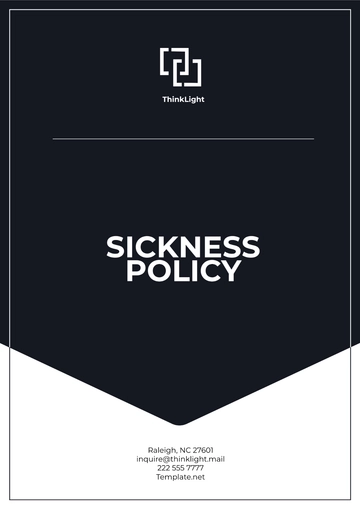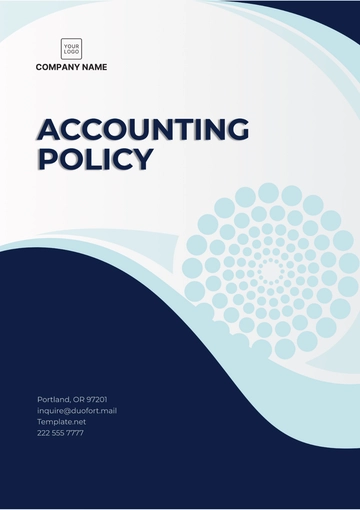Free Sales Department Policy & Procedure
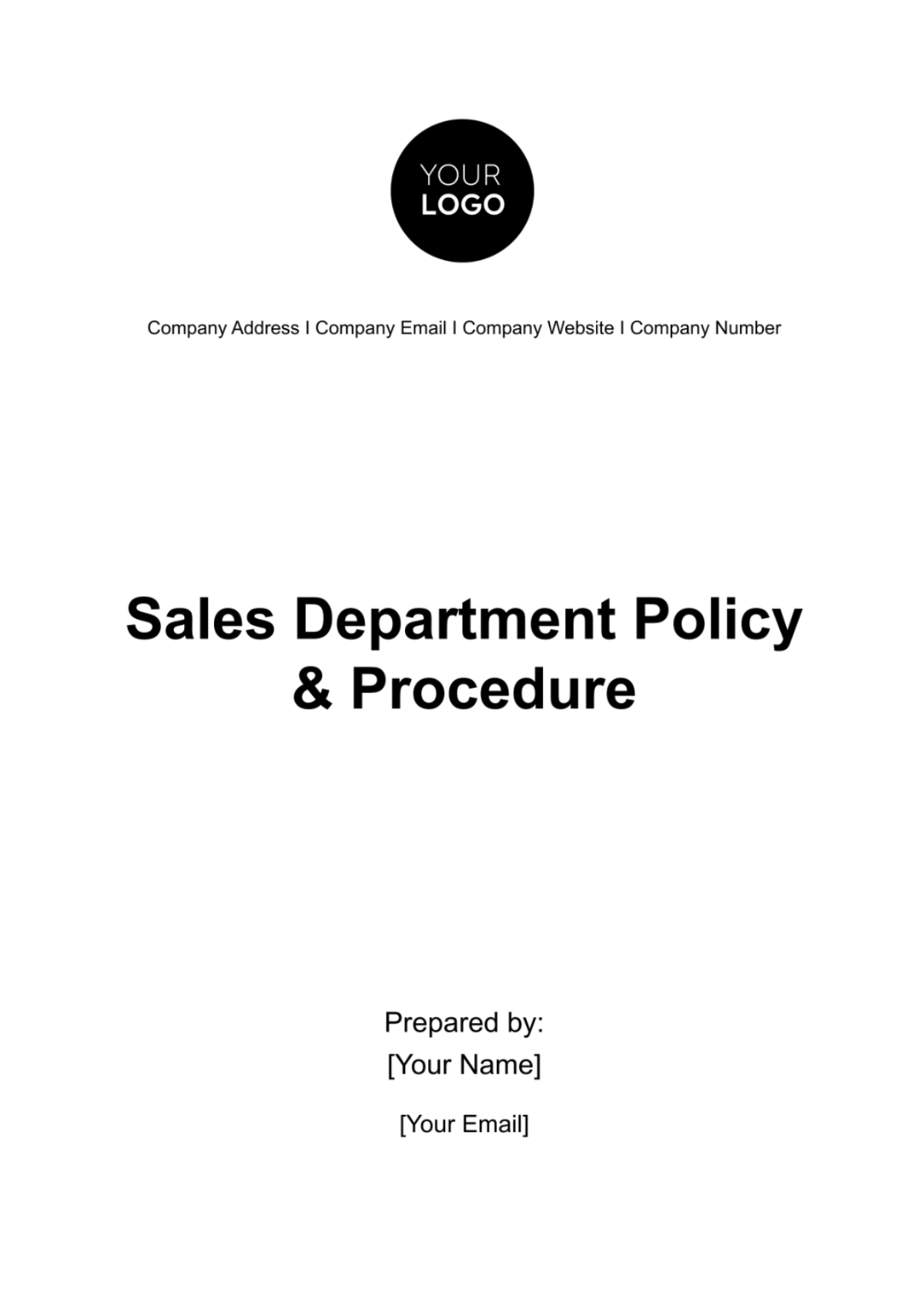
INTRODUCTION
The purpose of this policy and procedure document is to establish a comprehensive framework that governs the Sales Department's operations at [Your Company Name]. Designed to serve as an authoritative guide, this document outlines the department's mission, core objectives, and the standards of conduct expected of all employees who are part of the Sales Team.
Adherence to the guidelines set forth herein is vital for the uniformity of approach, the optimization of sales performance, and the promotion of a customer-centric culture. It is the responsibility of each member of the Sales Department to familiarize themselves with these policies and procedures and to implement them in their daily work routines.
OBJECTIVES
The objectives of this policy and procedure document serve as the foundational pillars upon which the Sales Department builds its operations and strategic goals. These objectives are intended to be specific, measurable, attainable, relevant, and time-bound (SMART) to ensure their practical implementation and effectiveness. They are as follows:
To cultivate and maintain positive relationships with customers through proactive engagement, excellent service, and a keen understanding of their needs, with the aim of achieving a specified net promoter score (NPS).
To rigorously adhere to all local, state, and federal regulations governing sales and customer interactions, thereby minimizing legal risks and upholding the company's reputation for ethical business practices.
To continually refine sales processes for greater efficiency and reduced costs, aiming for a specific decrease in the customer acquisition cost (CAC) and an increase in the average deal size.
To invest in the ongoing training and development of the Sales Team, thereby improving their skills, enhancing productivity, and boosting employee morale and job satisfaction.
To make extensive use of analytics and key performance indicators (KPIs) in strategic planning and decision-making processes, ensuring that actions are aligned with empirical data and corporate goals.
To regularly review and update the product or service offerings based on customer feedback and market trends, ensuring that [Your Company Name] remains competitive and responsive to market needs.
SCOPE
The scope of this policy and procedure document encompasses a broad range of activities, responsibilities, and personnel within the Sales Department at [Your Company Name]. Specifically, it applies to:
Sales Representatives: Individuals responsible for direct engagement with clients, lead generation, closing deals, and customer service.
Sales Managers: Employees overseeing the sales team, responsible for setting targets, tracking performance metrics, and providing coaching and professional development opportunities.
Administrative Staff: Those who provide logistical and organizational support to the Sales Department, including but not limited to data entry, appointment scheduling, and record-keeping.
Contract or Freelance Sales Agents: External individuals or entities who are contracted to perform sales functions for the company for a defined period.
Sales Channels: This policy covers sales activities conducted through various channels, including, but not limited to, face-to-face meetings, phone calls, emails, and online platforms.
Sales Tools and Resources: All tools, technologies, and resources, such as customer relationship management (CRM) software, utilized in the sales process are also covered under this policy.
Customer Interactions: Every form of communication and engagement with current and prospective customers falls under the purview of this policy, including pre-sales inquiries, the sales process itself, and post-sales support.
Compliance and Reporting: All processes related to legal obligations, customer data protection, and internal reporting mechanisms are within the scope of this document.
POLICY STATEMENTS
The policy statements outlined below define the core principles and rules that govern the Sales Department's activities. These policy statements serve as the cornerstone for establishing a culture of integrity, professionalism, and accountability within the department.
Policy | Details |
|---|---|
Ethical Conduct | All sales activities must be conducted following ethical and legal standards. Violations may result in disciplinary action. |
Customer Privacy | Customer data must be treated with utmost confidentiality and in compliance with applicable privacy laws, such as GDPR. |
Sales Targets | Sales targets are set on a quarterly basis and are aligned with the department's objectives. Performance reviews will occur for targets not met consecutively. |
Record-Keeping | Accurate and timely records of all sales transactions must be maintained in the CRM system. Inconsistencies may trigger an internal audit. |
Product Knowledge | Sales staff must have comprehensive knowledge of the products or services being offered to provide accurate and helpful information to customers. |
Customer Engagement | Customer engagement should be proactive, courteous, and focused on identifying and meeting customer needs. |
Contractual Agreements | All contractual agreements must be reviewed by legal counsel before finalization to ensure they meet regulatory and company standards. |
Pricing and Discounts | Pricing strategies and any offered discounts must adhere to company guidelines. Unauthorized price adjustments are prohibited. |
Professional Development | Ongoing training and development programs must be made available to the sales team to improve their skills and performance. |
Communication and Collaboration | Effective communication and collaboration within the department and with other departments are essential for achieving organizational goals. |
PROCEDURES
The following enhanced procedures are intended to provide a detailed, step-by-step guide for implementing the policies. Adherence to these procedures is critical for the Sales Department to maintain consistency and effectiveness in its operations.
Ethical Conduct
Sales staff must undergo ethics training upon employment and annually thereafter. This training is integral to fostering a culture of integrity and ethical behavior.
Compliance will be periodically assessed through internal audits and customer feedback. These audits help identify areas for improvement and mitigate potential risks.
Violations will result in immediate corrective actions, including potential disciplinary procedures up to and including termination. These measures are necessary to maintain a high standard of ethical conduct.
Customer Privacy
Collect data exclusively from customers who have provided explicit consent, ensuring to clearly inform them regarding the specific purposes for which their data will be utilized.
Store customer data in encrypted, secure databases compliant with GDPR or other applicable privacy laws. This ensures that customer information remains confidential and secure.
Only authorized personnel may access customer data, and a log must be maintained for all data access. This log serves as an additional layer of data security and accountability.
Sales Targets
Sales managers will set quarterly targets in consultation with senior management. These targets are aligned with the company’s broader financial goals.
Targets will be tracked monthly utilizing a comprehensive set of KPIs. The practice of regular, data-driven tracking is essential for identifying performance trends and enabling timely adjustments to sales strategies.
Failing to meet targets for two consecutive quarters will initiate a formal performance review and possible target adjustments. This step ensures that targets are realistic and achievable.
Record-Keeping
All sales transactions must be promptly entered into the CRM system with all relevant details. Accurate data entry is crucial for tracking and analytics.
An automated audit trail must be maintained for all changes made in the CRM system. This audit trail allows for transparency and accountability in data management.
Sales managers will conduct weekly reviews of CRM entries to ensure accuracy and completeness. This review process is vital for maintaining data integrity.
Product Knowledge
All sales staff must complete product training modules and pass a knowledge test. A high level of product knowledge enhances customer service and trust.
Regular briefings on product changes or new offerings must be attended by all sales staff. Continuous updates ensure that the sales team can adapt to market changes.
A central repository for product information must be maintained and regularly updated. This repository serves as a single source of truth for all product-related inquiries.
Customer Engagement
Sales representatives should respond to new inquiries or leads within a 24-hour window. Prompt responses improve customer satisfaction rates.
Maintain regular contact with existing customers to identify opportunities for upselling or cross-selling. Consistent engagement helps in building long-term customer relationships.
After the completion of a sale, seek feedback from customers to continuously improve the sales process. Customer feedback is invaluable for refining strategies and identifying areas of improvement.
Contractual Agreements
Sales agreements must be drafted following the company's standard templates. Standardization reduces errors and ensures legal compliance.
Contracts must be reviewed and approved by the legal department prior to customer presentation. Legal review prevents potential liabilities and ensures that all terms are in line with statutory regulations.
A copy of the signed agreement must be uploaded into the CRM system for record-keeping. Proper documentation is essential for future references and dispute resolution.
Pricing and Discounts
Adhere to the official pricing table for all standard sales transactions. Standardized pricing ensures uniformity and minimizes pricing errors.
Any deviations from standard pricing require managerial approval. Obtaining managerial approval for discounts helps maintain profitability and ensures fairness.
All approved pricing adjustments must be documented and stored in the CRM system. Detailed documentation is vital for auditing and accountability purposes.
Professional Development
A yearly training plan should be established for each sales representative. Training plans are crucial for setting performance expectations and development goals.
Quarterly skills assessments should be conducted to tailor ongoing training programs. These assessments help identify individual strengths and areas for growth.
Maintain a record of all completed training programs for each staff member. Well-maintained records facilitate performance evaluations and professional development planning.
Communication and Collaboration
Weekly sales meetings should be conducted to discuss targets, strategies, and challenges. These meetings offer a platform for team engagement and collective problem-solving.
Regular coordination with Marketing, Finance, and Customer Service departments is essential for holistic strategy execution. Cross-departmental collaboration is key to achieving organizational synergy.
Monthly reports summarizing sales activities, achievements, and challenges must be submitted to senior management. These reports are crucial for performance evaluation and strategic planning at the executive level.
PERFORMANCE METRICS
These KPIs are designed to be both quantitative and qualitative, encompassing a wide range of factors that contribute to sales success. Measurement of these KPIs will occur on a regular basis, ensuring continuous monitoring and enabling data-driven decision-making.
Revenue Generated: This KPI is measured by extracting data from the CRM system and analyzing it using specialized financial software. Its importance lies in gauging the direct financial impact of the Sales Department on the organization's bottom line. Specific revenue targets will be set at the beginning of each fiscal year and adjusted as necessary.
Conversion Rate: This metric is calculated by dividing the number of successful sales by the total number of leads approached, then multiplying by 100. A high conversion rate indicates effective sales strategies and strong customer engagement. Monthly conversion rate targets will be established, and performance will be assessed against these benchmarks.
Customer Retention Rate: This KPI is measured by analyzing transaction histories in the CRM system to identify repeat customers. Customer retention is often more cost-effective than acquiring new customers and serves as a key indicator of customer satisfaction. A yearly customer retention rate target will be set, aiming for incremental improvements over previous years.
Customer Lifetime Value (CLV): CLV is calculated using historical sales data, which factors in the average purchase frequency and customer lifespan. Understanding CLV is critical for more effective resource allocation toward high-value customers. Quarterly CLV targets will be determined, taking into account marketing costs and customer acquisition rates.
Net Promoter Score (NPS): The NPS is calculated based on these responses. A high NPS score is often associated with strong customer relationships and the potential for organic growth through word-of-mouth. Semi-annual NPS targets will be set with the aim of continuously improving customer satisfaction levels.
Cost per Lead: This metric is measured by dividing the total marketing and advertising expenditure by the number of leads generated in the same period. It aids in understanding the efficiency and cost-effectiveness of lead-generation strategies. Monthly targets will be established to gradually reduce the cost per lead while maintaining or improving lead quality.
Sales Cycle Length: This KPI is measured by aggregating data from the CRM system to calculate the average length of time between initial contact and final sale. A shorter sales cycle is indicative of an efficient sales process and faster revenue generation. Quarterly reviews will be conducted to identify opportunities for shortening the sales cycle without sacrificing quality.
CONCLUSION
This document serves as a guide outlining the policies, procedures, and key performance indicators that govern the Sales Department at [Your Company Name]. It aims to provide a structured framework for sales activities, ensuring alignment with organizational objectives and compliance with relevant regulations. Through the implementation of the specified policies and procedures, [Your Company Name] aims to create a culture of continuous improvement and accountability within the Sales Department. This approach is intended not only to meet but to exceed both internal targets and customer expectations, thereby contributing positively to the organization’s overall performance and success.
- 100% Customizable, free editor
- Access 1 Million+ Templates, photo’s & graphics
- Download or share as a template
- Click and replace photos, graphics, text, backgrounds
- Resize, crop, AI write & more
- Access advanced editor
Establish robust sales protocols with Template.net's Sales Department Policy & Procedure Template. This customizable document empowers you to define clear policies and procedures tailored to your organization's needs. Editable in our AI editor tool, this template is the cornerstone for businesses aiming to streamline their sales operations. Simplify workflows with Template.net!
You may also like
- HR Policy
- Restaurant Policy
- Company Policy
- Accounting Policies and Procedures
- Website Policy
- Privacy Policy
- Safety Policy
- School Policy
- IT and Software Policy
- Law Firm Policy
- Construction Policy
- Interior Design Policy
- Travel Agency Policy
- Education Academic Policy
- Security Policy
- Real Estate Policy
- Expense Policy
- Software Policy



